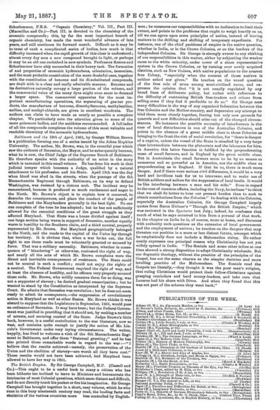Baltimore and the 19th of April, 1861, by George William
Brown is a publication forming one of a series issued by the Johns Hopkins University. The author, Mr. Brown, was, in the eventful year which saw the outburst of Secession, the Mayor, and he subsequently became, what he is now, the Chief Judge of the Supreme Bench of Baltimore. He therefore speaks with the authority of an actor in the story which is narrated in this small volume. He has done his work in that judicial temper which becomes a Judge, qualified by a natural attachment to his profession and his State. April 19th was the day when blood was shed in the streets, when the passage of the 6th Massachusetts Regiment through Baltimore, on its way to defend Washington, was resisted by a riotous mob. The incident may be remembered, because it produced so much excitement and anger in the North. Mr. Brown'e object is to explain how it occurred, to describe the consequences, and place the conduct of the people of Baltimore and the Marylanders generally in the best light. No one can complain of the tone he has adopted ; but he has not sufficiently allowed for the essential conditions of the great struggle as they affected Maryland. That State was a house divided against itself ; one large section being warm in support of Secession, another equally warm in hostility to the Southern claim, and a third neutral, properly represented by Mr. Brown. But Maryland geographically belonged to the North, and the roads to the capital of the Union lay through her territory. It is obvious that, when a war broke oat, the full right to use those roads mast be voluntarily granted or secured by force. That was a military necessity. Baltimore, whether in cense- quence of " blundering" or otherwise, contested the right of way, and nearly all the acts of which Mr. Brown complains were the direct and inevitable consequences of resistance. The State could not be neutral in such a conflict ; could not enjoy the rights of a neutral. The Federal Government required the right of way, and at least the absence of hostility, and its officers very properly secured those ends. Mr. Brown, who mildly censures them for so doing, was not a supporter of slavery; he desired gradual emancipation ; but he wanted to stand by the Constitution as interpreted by the Supreme Court. He admits that Secession was revolution ; but he does not seem ready to admit its consequence,—the suppression of revolutionary action in Maryland as well as other States. Mr. Brown thinks it was aboard to suppose that the Legislature in September, 1861, would pass an ordinance of Secession. It may have been ; but the Federal Govern- ment was justified in providing that it should not, by making a number of arrests, and securing control of the State. Judge Brown's little book, however, is a useful contribution to the war literature, now so vast, and contains quite enough to justify the action of Mr. Lin- coln's Government under very trying circumstances. The writer, happily, has lived to welcome a visit of the 6th Massachusetts Regi- ment to Baltimore, and offer them "fraternal greeting;" and be has also printed these remarkable words in regard to the war I believe that the results achieved—namely, the preservation of the Union and the abolition of slavery—are worth all they have cost." These results would not have been achieved, had Maryland been allowed to have her way in 1861.


















































 Previous page
Previous page